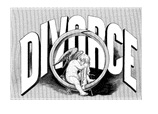
On Divorce
HARVARD DIARY
When I was a small boy I lived in a quiet, comfortable town on a street lined by single family homes — a Norman Rockwell America amidst the widespread suffering and vulnerability of the 1930s. We all knew one another, the children and their parents. We knew about one another, too: the boy who had rheumatic heart disease, and might not make it to 10, then a distant age for some of us just starting school; the girl whose dad had a rare and puzzling illness which I now realize to have been multiple sclerosis. We knew, as well, that so-and-so drank too much, that a particular set of parents didn’t get on — fights overheard during those summer evenings when open windows allowed the sound of radios and live human voices to travel far and wide. Still, every single family on the street had two parents — until, one day, we all learned that a tragedy (the word our parents kept using) had taken place: Buzzy and Sally, a boy and girl of our approximate age (five to seven), were losing their father — he had moved out, was asking for a “divorce.” To this day I can recall the shock, the confusion that word prompted in us children — a strange word, a charged word, a scary word. I remember my brother and me asking our parents about it — what a divorce meant, why it happened. I remember their surprise, their sadness, their dismay — not a response, I might add, based primarily on religious disapproval, but one grounded in the secular values of that time: Divorce was a rare step, a drastic one, an occasion for a good deal of soul-searching and regret among neighbors, never mind the two adults involved, and never mind any children they might have.
Now, of course, as I write the above, I feel like a survivor from another world, one that disappeared a few centuries ago. Now divorce is everywhere — one of two marriages ends in it. Now the intensely felt sense that a marriage is a lifelong commitment no longer dominates most neighborhoods, as was the case in the one where I grew up and learned what to value and why. Now, in fact, my profession of psychoanalytic psychiatry is often summoned to defend particular divorces, even the more general phenomenon of divorce, as a readily available and far from objectionable alternative to what is often called a “bad” marriage, meaning, of course, one in which psychological pain is to be found.
No doubt, many marriages are, indeed, a terrible burden to both partners — occasions for constant fear, suspicion, bitterness, even hate and violence. Who would want such so-called unions to be held in travesty by not being challenged psychologically, socially, legally? Put differently, some marriages are so destructive to the humanity of all involved, each parent and any child of theirs, that they are simply going to end — and even the Catholic Church, which decidedly shuns what our culture has done with divorce (turned it into yet another of those “options” that go with “freedom,” with “progress”), has her own “release” of sorts for such men and women (and their children): “annulments,” which have become increasingly prevalent.
You May Also Enjoy
To be a father is to love the children enough to give them boosts, examples, and assistance but also to stumble with them, before them, on their account.
An enormous irony shadows us throughout life: our capacity, our willingness even, to talk one line and live another — like the policeman caught stealing, the lawyer who breaks the law.
As I write this column, America’s magazines and newspapers are offering a fairly extended discussion…

